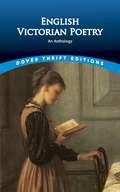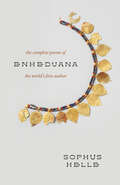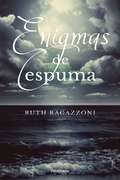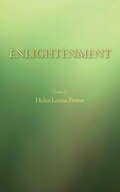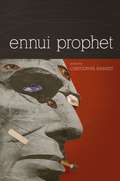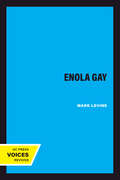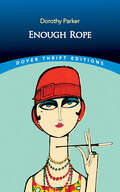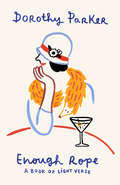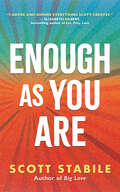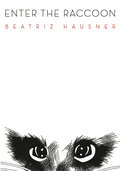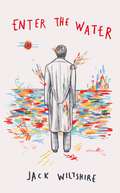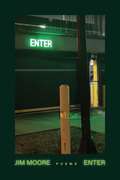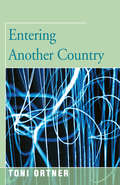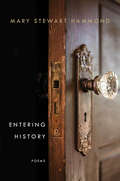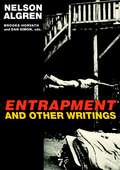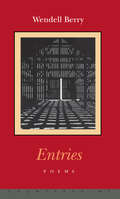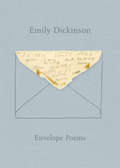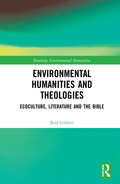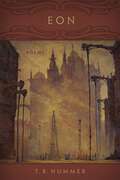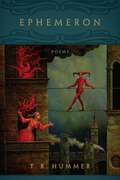- Table View
- List View
English Victorian Poetry: An Anthology (Dover Thrift Editions)
by Paul NegriThis outstanding, modestly priced anthology presents over 170 poems by the major poets of the 19th century, including Alfred, Lord Tennyson; Robert Browning; Elizabeth Barrett Browning; Arthur Hugh Clough; Edward FitzGerald; Matthew Arnold; Dante Gabriel Rossetti; Christina Rossetti; Coventry Patmore; George Meredith; William Ernest Henley; Algernon Charles Swinburne; Gerard Manley Hopkins; Rudyard Kipling; and many others. An introduction and brief biographical notes on the poets are included. Includes 2 selections from the Common Core State Standards Initiative: "The Jumblies" and "Jabberwocky."
Enheduana: The Complete Poems of the World's First Author
by Sophus HelleThe complete poems of the priestess Enheduana, the world&’s first known author, newly translated from the original Sumerian Enheduana was a high priestess and royal princess who lived in Ur, in what is now southern Iraq, about 2300 BCE. Not only does Enheduana have the distinction of being the first author whose name we know, but the poems attributed to her are hymns of great power. They are a rare flash of the female voice in the often male-dominated ancient world, treating themes that are as relevant today as they were four thousand years ago: exile, social disruption, the power of storytelling, gender-bending identities, the devastation of war, and the terrifying forces of nature. This book is the first complete translation of her poems from the original Sumerian. Sophus Helle&’s translations replicate the intensity and imagery of the original hymns—literary time bombs that have lain buried for millennia. In addition to his translations, Helle provides background on the historical context in which Enheduana&’s poems were composed and circulated, the works&’ literary structure and themes, and their reception in both the ancient and the modern world. Unjustly forgotten for millennia, Enheduana&’s poems are essential reading for anyone interested in the literary history of women, religion, the environment, gender, motherhood, authorship, and empire.
Enigmas de espuma
by Ruth RagazzoniPoemas vitales y relatos cortos sobre el alma, el amor y la espera. <P><P>Cuando se sumerja en los enigmas navegará a través de poemas que hablan de las miradas que jamás pudimos olvidar, de lo que supone la inspiración para aquellos que la inspiramos, de los largos paseos por los parques de nuestra niñez, del primer amor y su sedosa sensación, del que quisimos salvar mientras no nos dábamos cuenta que nos hundíamos más y más... o de aquel amor que nos dejó para viajar más allá de las estrellas, aquellas que cuando admiramos tintinean a través de nuestras distraídas lágrimas. <P><P>También conocerá a personajes a través de relatos cortos con los que podrá identificarse. En su periplo por el mismo quizás se reencuentre con momentos que le evoquen aquella mirada que jamás pudo olvidar o aquel beso del que no quiso desprenderse.
Enlightenment
by Helen Louise PorterHelen Louise Porter’s collection ENLIGHTENMENT is, on the surface, a quiet book containing less than thirty short poems. Look closer, however, and you will realise that it is full of powerful emotions: each poem comes direct from the author’s heart and soul.ENLIGHTENMENT is a collection that combines love and joy. It can be read at any time and will bring many hours of happiness.
Ennius and the Architecture of the Annales
by Jackie ElliottEnnius' Annales, which is preserved only in fragments, was hugely influential on Roman literature and culture. This book explores the genesis, in the ancient sources for Ennius' epic and in modern scholarship, of the accounts of the Annales with which we operate today. A series of appendices detail each source's contribution to our record of the poem, and are used to consider how the interests and working methods of the principal sources shape the modern view of the poem and to re-examine the limits imposed and the possibilities offered by this ancient evidence. Dr Elliott challenges standard views of the poem, such as its use of time and the disposition of the gods within it. She argues that the manifest impact of the Annales on the collective Roman psyche results from its innovative promotion of a vision of Rome as the primary focus of the cosmos in all its aspects.
Ennui Prophet
by Christopher Kennedy"Singular and deeply pleasurable. Christopher Kennedy's prosetry is a lonely anarchic nation-state unto itself, half vacation funspot, half eerie purgatorial layover."-Dave EggersThe poems in Ennui Prophet, Christopher Kennedy's fourth collection, range from deeply personal explorations of relationships with family and friends, to examinations of the political climate in the first decade of the millennium. Whether personal or public, Kennedy gazes through a slightly distorted lens to better see the world around us.Christopher Kennedy's previous book, Encouragement for a Man Falling to His Death (BOA Editions Ltd., 2007) received the Isabella Gardner Poetry Award. He directs Syracuse University's MFA program in creative writing.
Ennui Prophet (American Poets Continuum #127)
by Christopher Kennedy"Singular and deeply pleasurable. Christopher Kennedy's prosetry is a lonely anarchic nation-state unto itself, half vacation funspot, half eerie purgatorial layover."-Dave EggersThe poems in Ennui Prophet, Christopher Kennedy's fourth collection, range from deeply personal explorations of relationships with family and friends, to examinations of the political climate in the first decade of the millennium. Whether personal or public, Kennedy gazes through a slightly distorted lens to better see the world around us.Christopher Kennedy's previous book, Encouragement for a Man Falling to His Death (BOA Editions Ltd., 2007) received the Isabella Gardner Poetry Award. He directs Syracuse University's MFA program in creative writing.
Enola Gay (New California Poetry #2)
by Mark LevineSome devastation has struck the soul and the Earth alike, and in Enola Gay, his second volume of poems, Mark Levine surveys the disaster. Here is a volume of poetry approaching Carolyn Forche's The Angel of History as a stark meditation on Blanchot's sense of writing as the "desired, undesired torment which endures everything." Levine engages the traditional resources of lyric poetry in an exploration of historical and cultural landscapes ravaged by imponderable events. Enola Gay's "mission" can seem spiritual, imaginative, and militaristic as the speaker in these poems surveys marshes and fields and a land on the edge of disintegration. Levine sifts the psychological residue that accumulates in the wake of unspeakable acts and so negotiates that terrain between the banality of language and the need to stand witness and to speak. Levine's stunning second book, with its grave cultural implications and its surveillance of a distinctly postmodern malaise, offers multiple readings. Here are compact poems with uncanny power, rhythm, and a strange, formal beauty echoing and renewing the legacy of Wallace Stevens for a new era.
Enough Rope (Dover Thrift Editions: Poetry)
by Dorothy ParkerRenowned for her acerbic wit, cynicism, and satirical humor, Dorothy Parker skewered the pretensions of everyday life and clichéd relations between men and women in her debut poetry collection, published in 1926. Originally printed in Vanity Fair, The New Yorker, and Life magazine, her early poems were a runaway success with the young, liberated women of the Jazz Age. Notable for their lighthearted, clever verse and razor-sharp quips, the selections include “A Well-Worn Story,” “Godspeed,” “News Item,” “Résumé,” “The False Friends,” “Verse for a Certain Dog,” and many others. Once known as “the wittiest woman in America,” Parker was a founding member of the Algonquin Round Table and the Screen Writers Guild.
Enough Rope: A Book of Light Verse (Vintage Classics)
by Dorothy ParkerNow available as a stand-alone edition, the famous humorist&’s debut collection—a runaway bestseller in 1926—ranges from lighthearted self-deprecation to acid-tongued satire, all the while gleefully puncturing sentimental clichés about relations between men and women.Known as the wittiest woman in America and a founder of the fabled Algonquin Round Table, Dorothy Parker was also one of the Jazz Age&’s most beloved poets. Her verbal dexterity and cynical humor were on full display in the many poems she published in Vanity Fair, The New Yorker, and Life and collected in her first book in 1926. The poems in Enough Rope range from lighthearted self-deprecation to acid-tongued satire, all the while gleefully puncturing sentimental clichés about the relations between men and women. Unfortunate CoincidenceBy the time you swear you&’re his, Shivering and sighing,And he vows his passion is Infinite, undying—Lady, make a note of this: One of you is lying.
Enough as You Are
by Scott StabileIn this heart-expanding collection of poetry and short prose, Scott Stabile delivers liberating truths rooted in the premise that each of us is beautiful, whole, and enough — just as we are. With the same wise, humorous, and unembellished voice that has garnered him hundreds of thousands of followers online, Scott assures us that our worth is inherent, our authenticity bridges the path to freedom, and with willingness and commitment, deep self-love is possible for each of us. Enough as You Are, like all his work, reminds us that love is our greatest healer and invites us to consider the positive transformations that can occur when we move through the world with love as our foundation.
Enter the Raccoon
by Beatriz HausnerEnter the Raccoon documents a love affair between a woman and a raccoon. They are a couple that loves without preconceptions, whose being together eschews all limits until their beliefs in the self are put to the test. Their story unfolds each time one surrenders to the other in a sometimes melancholic and cruel, other times joyful, even ecstatic embrace.
Enter the Water
by Jack Wiltshire'A dark-light beauty' Ali Smith'Totally compelling, Enter The Water pulls you along like a current. Gentle, deft, spacious yet searingly vivid, it wanders like our narrator and shows us both nature and the city through new eyes . . . This book will sneak up on you and leave its music long ringing in your ears' Cecilia Knapp'Enter the Water is both visceral and perceptive, a discomfort formulated in great tenderness and pain' Bhanu Kapil 'Enter the Water has horizons and wit and allusion and rhyme and disenchanted politics and birds, and lines that hit the reader right in the heart . . . The writing is original and perfectly pitched . . . A significant debut' Ian Pattersoni sat in a chapel the other night in my big gay coat talking to a god whose answer is only sometimes no no that was a lie the house of god was closed the night i needed him i sat outside on the granite steps of a fountain happily pouring itself an eternal supplyENTER THE WATER follows a young man who becomes homeless when he is evicted from his flat in Cambridge during the turbulent early months of 2022. As the wind stirs, our narrator embarks on a journey from his park bench out towards the coast, wrapped in his 'big gay coat', accompanied by his pigeons, a blackbird and Storm Eunice - 'Nature' in colourfully alive and playful forms. Along the way he searches for a beauty inherent to all of us, and then calls us to reclaim it. ENTER THE WATER is a story invested in care - care towards the environment; towards the political realities of recession and the war in Ukraine; towards the dynamic self, the human whose love for swimming becomes synonymous with self-acceptance and survival; and to everyone, managing to manage. Walking along the edges of our troubled current affairs, animated by a spirit of cheerful protest, this book is an offering and an urgent invitation to exit and re-enter our world - and to celebrate our capacity for courage in times of suffering.
Enter: Poems
by Jim MooreIn Enter, poet Jim Moore navigates the public spaces of his neighborhood—parks, boardwalks, piazzas, even parking garages—and encounters people negotiating mortality in the pandemic age just as he is coming to terms with his own long story. In his signature lucid and wry voice, Moore acknowledges suffering while making room for joy and for moments of peace. These poems offer shelter to readers and, in summoning poets like Rilke and Tsvetaeva, remind us that poetry’s tenderness can be repaid in tenderness. “Please show me how to be you,” he writes in deeply intimate lines revealing a poettapped into the networks of human connection vibrating under the surface of all the places humans gather.Enter is a collection of thoughtful meditations on hope at a moment when hope seems far-fetched, when humanity is faced with the inevitability of being “grazed upon by earth.” Yet Moore finds the joy, he writes of shyness and the bells of a church resounding, of counting hours: “I find words. I write of love.” Enter is a collection of thoughtful meditations on hope at a moment when hope seems farfetched, when humanity is faced with the inevitability of being ‘grazed upon by earth.” Yet Jim Moore finds the joy, he writes of shyness and the bells of a church resounding, of counting hours: “I find words. I write of love.”
Entering Another Country
by Toni OrtnerReview by Helen Cooper in Motheroot Journal The title poem, "Entering Another Country", is dedicated to a male friend who has died. There are exuberant, rich landscapes of imagined travel, journeys into the visual worlds of Grandma Moses and Rousseau, and the painful realization that what the poet means by travel is change and growth, the raw experience of self-birthing, a process into a place as unknown as the death place of her friend. Here Ortner connects with her female heritage. It is a courageous poem of breaking out, and the unfamiliar terrain into which this takes her almost robs the poet of speech.
Entering History: Poems
by Mary Stewart HammondLyrical narratives that chronicle a long marriage, rich with wit, dark irony, and poignancy. In her long-awaited second volume, Mary Stewart Hammond chronicles a long marriage with sharp wit, dark irony, and poignancy. As James Merrill says of Hammond’s poems, they “brim with what the whole world knows.” Entering History opens on a middle-aged couple, modern-day travelers in an ancient setting. The collection follows their relationship through time and place, combining the personal and the historical in stories of the family—siblings, a daughter, and the very different marriage of the poet’s parents. The marriage poems share the intimacy, erotic playfulness, irritations, worries, and angers that are part of an enduring love and a long marriage. In “Portrait of My Husband Reading Henry James,” the poet paints her husband using syntax and language that evoke James’s. In “Venasque,” the wintry village, perched on the edge of a cliff, serves as a metaphor for the existential crisis facing the couple. “Lines composed at Beaufort, South Carolina, a few miles above Parris Island,” about the poet’s brother, moves back and forth between the Civil War and the preparations of troops for today’s wars. In “Jacob and Esau with Sister,” two brothers, in a transaction as old as oral history, highlight its consequences in the twenty-first century. “Anniversary” is a heartbreaking elegy for a third brother who kills himself. Hammond reaches into the past and present of the American family, closing Entering History where it began, with the couple in bed, now older, harkening back to the bed they shared when they were newlyweds. These powerful, beautifully crafted, lyrical narratives give depth to an examination of life—its joys, sorrows, laughter, and tragedies.
Entrapment and Other Writings
by Nelson Algren Dan Simon Brooke HorvathNelson Algren sought humanity in the urban wilderness of postwar America, where his powerful voice rose from behind the billboards and down tin-can alleys, from among the marginalized and ignored, the outcasts and scapegoats, the punks and junkies, the whores and down-on-their luck gamblers, the punch-drunk boxers and skid-row drunkies and kids who knew they'd never reach the age of twenty-one: all of them admirable in Algren's eyes for their vitality and no-bullshit forthrightness, their insistence on living and their ability to find a laugh and a dream in the unlikeliest places. In Entrapment and Other Writings--containing his unfinished novel and previously unpublished or uncollected stories, poems, and essays--Algren speaks to our time as few of his fellow great American writers of the 1940s and '50s do, in part because he hasn't yet been accepted and assimilated into the American literary canon despite that he is held up as a talismanic figure. "You should not read [Algren] if you can't take a punch," Ernest Hemingway declared. "Mr. Algren can hit with both hands and move around and he will kill you if you are not awfully careful."
Entre La Chair et L'Ame
by Huguette BertrandExcerpt<P> d'un passé arrimé<P> aux départs fragiles<P> que viennent agiter<P> les bruits<P> des pas sourds<P> de l'ennui<P> livré au hasard<P> d'un horizon docile<P> muet<P> 15 nov. 97
Entries
by Wendell BerryIn this gathering of work from the past fifteen years, Wendell Berry offers poems of remembrance and regeneration, celebrating life's complexities from the domestic to the eternal.
Entries
by Wendell BerryIn these poems, Wendell Berry combines plainspoken elegance with deeply felt emotion—this is work of both remembrance and regeneration. Whether writing as son of a dying father or as father of a daughter about to be wed, Berry plumbs the complexities of conflict, grief, loss, and love. He celebrates life from the domestic to the eternal, finding in the everyday that which is everlasting.
Envelope Poems
by Emily Dickinson Jen Bervin Marta WernerAnother gorgeous copublication with the Christine Burgin Gallery, Emily Dickinson's Envelope Poems is a compact clothbound gift book, a full-color selection from The Gorgeous Nothings. Although a very prolific poet—and arguably America’s greatest—Emily Dickinson (1830–1886) published fewer than a dozen of her eighteen hundred poems. Instead, she created at home small handmade books. When, in her later years, she stopped producing these, she was still writing a great deal, and at her death she left behind many poems, drafts, and letters. It is among the makeshift and fragile manuscripts of Dickinson’s later writings that we find the envelope poems gathered here. These manuscripts on envelopes (recycled by the poet with marked New England thrift) were written with the full powers of her late, most radical period. Intensely alive, these envelope poems are charged with a special poignancy—addressed to no one and everyone at once. Full-color facsimiles are accompanied by Marta L. Werner and Jen Bervin’s pioneering transcriptions of Dickinson’s handwriting. Their transcriptions allow us to read the texts, while the facsimiles let us see exactly what Dickinson wrote (the variant words, crossings-out, dashes, directional fields, spaces, columns, and overlapping planes). This fixed-layout ebook is an exact replica of the print edition, and requires a color screen to properly display the high-resolution images it contains. For this reason, Envelope Poems is not available on devices with e-ink screens, such as Kindle Paperwhite. We apologize for any inconvenience.
Environmental Humanities and Theologies: Ecoculture, Literature and the Bible (Routledge Environmental Humanities)
by Rod GiblettMany ways of thinking about and living with ‘the environment’ have their roots in the Bible and the Christian cultural tradition. Environmental Humanities and Theologies shows that some of these ways are problematic. It also provides alternative ways that value both materiality and spirituality. Beginning with an environmentally friendly reading of the biblical story of creation, Environmental Humanities and Theologies goes on to discuss in succeeding chapters the environmental theology of wetlands, dragons and watery monsters (including crocodiles and alligators) in the Bible and literature. It then gives a critical reading of the environmental theology of the biblical book of Psalms. Theological concepts are found in the works of English writers of detective and devotional stories and novels, American nature writers and European Jewish writers (as succeeding chapters show). Environmental Humanities and Theologies concludes with an appreciation for Australian Aboriginal spirituality in the swamp serpent. It argues for the sacrality of marsh monsters and swamp serpents as figures of reverence and respect for living bio- and psycho-symbiotic livelihoods in bioregions of the living earth in the Symbiocene. This is the hoped-for age superseding the Anthropocene. Environmental Humanities and Theologies is aimed at those who have little or no knowledge of how theology underlies much thinking and writing about ‘the environment’ and who are looking for ways of thinking about, being and living with the earth that respect and value both spirituality and materiality. It is a new text nurturing sacrality for the Symbiocene.
Eon: Poems (Southern Messenger Poets)
by Terry HummerA poetic study of the eternal, T. R. Hummer’s new collection Eon, as with the other volumes in this trilogy—Ephemeron and Skandalon—offers meditations on the brief arc of our existence, death, and beyond. With vivid, corporeal imagery and metaphysical flourishes, the poet explores how the dead influence the ways we understand ourselves. Anchored with a series of poems that can be read as extended epitaphs, the collection closes with a gesture toward the redemptive power of love. In the tradition of Rainer Maria Rilke, Emily Dickinson, and Philip Levine, Eon shows us the power of being “simple expressions of our earth. It imagined us, / And was imagined by something nameless in return.”
Ephemeron: Poems (Southern Messenger Poets)
by T. R. HummerT. R. Hummer's new and characteristically pyrotechnic collection takes its title from the rare (in English) singular form of the common word "ephemera." In a work of startling originality, the poet presents a meditation on ephemerality from the point of view of the ephemeron itself as it passes, be it the individual, the atom, the particle.Hummer's work is existential and atemporal. The scope of the poems gradually broadens from the opening section, also called "Ephemeron," through "Either/Or," which is a fulcrum, on to plural "Ephemera." The vision that emerges is haunting, evoking the aftermath of a physical, psychological, and spiritual apocalypse.Relentless in its stalking of the boundary between being and nonbeing, Ephemeron becomes a tour-de-force that shines a spotlight into dark corners of Being, revealing yet more darkness.
